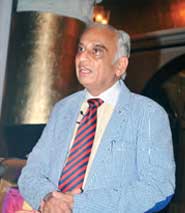
Rotarians learn about the evolution of medicine
Dr. Prakash Pispati
Dr. Prakash Pispati has a BSc (Hons) in Microbiology from St. Xavier’s College, an MD degree from Grant Medical College, and received his post-doctoral training in rheumatology in the UK and USA. He is the Director of Rheumatology at Jaslok Hospital & Research Centre and the Senior Consultant Rheumatologist at Saifee Hospital. He is also a Fellow of the Royal Society of Medicine, London, UK, and an International Fellow Member of the American College of Rheumatology.A recipient of the Lifetime Distinguished Services Award honoured by the Indian Rheumatology Association, Dr. Pispati began his talk at the Rotary meeting by stating, “I may have spoken at various events across five continents but the stage that I shall have for the next twenty minutes is the one that I will cherish the most.”

 Dr. Pispati presented an informative narration of the golden moments in the evolution of medicine with humorous undertones. Dr. Pispati began with the ancient practices of medicine in Greece and Rome, followed by recalling the father of Indian medicine Charaka and the father of Western medicine Hippocrates.
Dr. Pispati presented an informative narration of the golden moments in the evolution of medicine with humorous undertones. Dr. Pispati began with the ancient practices of medicine in Greece and Rome, followed by recalling the father of Indian medicine Charaka and the father of Western medicine Hippocrates.
Dr. Pispati spoke of the celebrated painter Leonardo da Vinci’s mastery over the human form. “Many of you may or may not know, that Leonardo perfected the maxillary sinuses on the most scientific lines to bring out that captivating smile of Mona Lisa,” said Dr. Pispati, adding that Leonardo dissected 27 bodies to achieve this perfection. “The renal arteries and the aortic arch were first described not by an anatomist or a doctor, but by Leonardo da Vinci!”
Tracing the origins of the small pox vaccine to a general practitioner in Yorkshire, UK, and the creation of the stethoscope to a young physician in Paris, the award-winning doctor narrated anecdotes about the birth of the microscope, the cure for diabetes, the insurgence of AIDS in the Western world and the invention of the first anti-rheumatic wonder drug aspirin before moving on to medicine as it is practised today.
Science has come a long way, he noted. “Today, patients with back pain and Ankylosing Spondylitis can be made to walk in just about twenty days. We have advanced medicines to mobilise such patients.”
Dr. Pispati also broached the topic of Ayurveda, the ancient practice of medicine in India. “The practice of Ayurveda is dwindling as there is not enough funding whereas allopathy is an ascending science but only in a fractional way,” said Dr. Pispati.
Deriding the growing practice of self-medication, Dr. Pispati commented on how people today are turning to Google to cure their ailments rather than visiting doctors. Dr. Pispati stated, “Will medicine forget the sense of healing touch and compassion like it happened in Greece with Hippocrates or how it is happening in this country with Ayurveda?” He noted that people are forgetting that the art of healing requires a holistic approach.
“Ladies and gentlemen, let’s face it, one requires science and the healing touch of a doctor to cure a patient,” Dr. Pispati signed off.
